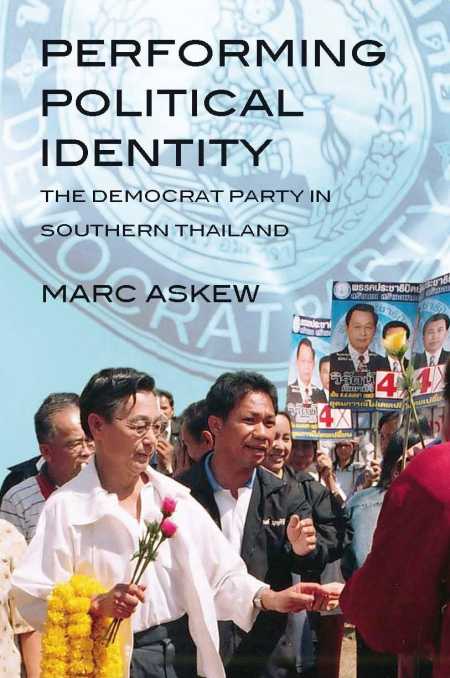Performing Political Identity is an anthropological fieldwork-based study that explores the Democrat Party’s electoral dominance in southern Thailand, or more precisely, in its Buddhist-majority and Thai-speaking provinces. This “Democrat Ascendancy,” as I call it, dates from 1992 but is based on strong foundations established since the mid 1970s. It is founded on electoral performance and histrionics that tap the southern electorate’s ideal representations of itself, but it is also based on interest groups which reproduce themselves through phuak groupings (tightly-knit coteries) that are embedded as a critical power group in regional and provincial political and bureaucratic networks. Electoral dominance is therefore based on a broader-reaching political dominance founded on networks, patronage and phuak alliances. In this sense, southern politics shares structural similarities with most of Thailand, despite claims to uniqueness.
The Democrat Party’s continuing electoral monopoly in Thailand’s south has been much remarked upon by scholars and other commentators, but never adequately explored, and certainly not through studies of election organization and campaigns. Most “explanations” are simplistic and reductionist, relying on notions of a primordial “southern Thai culture” (a set of inherited attitudes purportedly centring on self-dependence and defiance of central authority) or the party’s cynical manipulation of noble, yet na├пve southern chaoban. In this study, however, I do not employ any monolithic concept of culture as a foundational explanation, but rather view claims of identity as normative and ideal categories that are mobilized in the political arena in efforts to define political solidarities. Though such categories as “khon tai” are real and meaningful to people, they are none the less constructions, and, as in all societies these ideals (phuak loyalty, for example) are often contradicted in actual practice. Democrat Party rhetoric, symbolization and ritualized political “performance” mobilize these solidarities against their demonic “other”, the party’s political enemies.
This book is based upon an intensive study of political groups and election organization and campaigns in Songkhla Province between late 2003 and early 2005, a period when the Democrat Party at a national level was in disarray, and attempting to defend its only remaining political bastion in the south against Thaksin Shinawatra’s Thai Rak Thai electoral juggernaut. It was an opportune period to investigate political groups and election tactics in the south. The book narrates and analyses election contests during this period at municipal, provincial and national levels, highlighting the character of political rhetoric and performance at election rallies, political alliances among political phuak groupings (among Democrat-affiliated groups and their opponents), the role of political families, patronage and vote-buying. In 2005, the southern Democrats were able to rebuff the TRT onslaught in the south, a striking contrast with their comprehensive defeat elsewhere in the country, through effectively mobilizing phuak networks and potent symbols of political virtue, together with the judicious use of money in certain tough constituency contests.
The narrative chapters are followed by an analytical chapter which argues that Democrat Party solidarity in the South draws its strength from the two complementary patterns: person-focused phuak loyalties (that serve to link the higher and middle ranks of party supporters) and romanticized myths of the party as a moral and trustworthy being (linking ordinary people to the idea of the party). An epilogue chapter describes political events and the fortunes of the party from 2006 to the later months of 2007.
Though the book was completed a few months prior to the recent December 2007 national election, the results in the Thai-speaking south highlight how resilient the Democrat Party ascendancy remains there, despite the party’s parliamentary opposition status in national politics. The persistence of this ascendancy will depend on the extent to which intersecting and multi-level phuak networks can maintain coherence in the face of individual members’ political ambitions and whether the dominant myths of the party maintain their emotional hold on ordinary people.
 Facebook
Facebook  Twitter
Twitter  Soundcloud
Soundcloud  Youtube
Youtube  Rss
Rss 